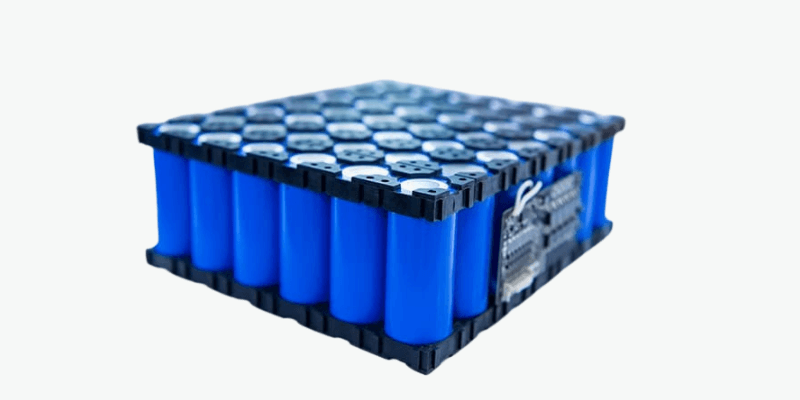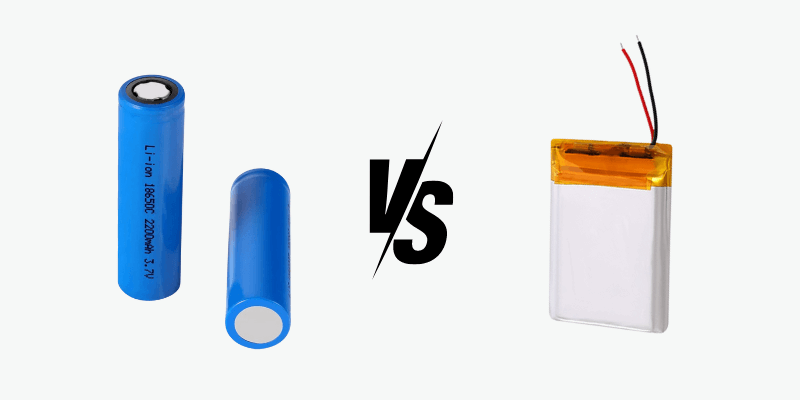Lithium-ion and lithium-polymer batteries are the primary options in the lithium-based battery market. Understanding their key differences is crucial for selecting the optimal battery solution. As a custom battery pack manufacturer, we’ll explore the characteristics of each to help you decide.
What Is A Lithium-ion Battery?
A lithium-ion (Li-ion) battery use the reversible intercalation of Li+ ions into conductive solids to store energy. Li-ion batteries power a wide range of products, including wireless headphones, appliances, power tools, toys, and electric vehicles.
Advantages Of Lithium-ion Batteries
Lithium-ion batteries have the following advantages:
- High Energy Density: Lithium-ion batteries can store more energy in a given volume (150 and 220 Wh/Kg), making them ideal for portable electronics and electric vehicles.
- Low Cost: They are generally more cost-effective to produce than other lithium-based batteries.
- Proven Technology: Lithium-ion technology has been around longer, resulting in more reliable performance.
- Efficiency: These batteries have a lower self-discharge rate, allowing them to retain their charge for longer when not in use.
Disadvantages Of Lithium-ion Batteries
Lithium-ion batteries have disadvantages as below:
- Safety Concerns: Li-ion batteries, though improved, can still pose safety risks if mishandled or subjected to extreme conditions.
- Less Flexibility: Lithium-ion batteries have a rigid shape, limiting device design options.

What Is A Lithium-polymer Battery?
Lithium-polymer battery (LiPo) uses a polymer electrolyte instead of a liquid. The semisolid gel polymers provide high conductivity. These batteries offer higher energy density than other lithium battery types, making them useful for weight-sensitive applications like mobile devices and RC aircraft.
Advantages Of Lithium-polymer Batteries
Lithium-polymer batteries have several advantages over traditional lithium-ion batteries:
- Higher Energy Density: In general, LiPo batteries can store more energy in a smaller space (100–265 Wh/kg), making them ideal for compact devices.
- Lightweight: Lithium-polymer batteries are often lighter than lithium-ion batteries due to their design.
- Flexibility: They can be made in different shapes and sizes to fit specific device designs.
- Faster Charging: LiPo batteries charge more rapidly than lithium-ion batteries.
- Longer Lifespan: These batteries have a longer cycle life (500-800 cycles), allowing more charge and discharge cycles before degradation.
Disadvantages Of Lithium-polymer Batteries
While lithium-polymer batteries offer several advantages, they also have some drawbacks:
- Higher Cost: LiPo batteries are generally more expensive to produce than lithium-ion batteries.
- Swelling: These batteries will swell during charging or over time, impacting device performance and safety.
- Limited Availability: Lithium-polymer battery options are less varied than lithium-ion batteries.
- Complex Charging Requirements: Charging LiPo batteries requires specialized chargers and careful monitoring.

Lithium-ion vs. Lithium Polymer Batteries: Which is Safer?
When choosing a battery, safety is important.
While Li-ion and Li-poly batteries are generally safe, Li-poly batteries are more stable due to their solid/gel electrolyte, reducing leakage or combustion risk. Li-poly’s flexible packaging also offers better mechanical stability.
However, the chance of lithium-ion batteries catching fire is one in a million, which is far less likely than being struck by lightning (1 in 13,000). If you aren’t afraid of lightning strikes, you needn’t worry about your lithium-ion batteries combusting due to overheating.
If designed with a compatible BMS and operated under proper conditions, lithium-ion batteries should perform well.
Difference Between Lithium-ion And Lithium Polymer Battery
From the above information, you can see that both lithium-ion and lithium-polymer batteries have their strengths and weaknesses. Here are the key differences summarized:
| Feature | Lithium-Ion | Lithium-Polymer |
| Energy Density | High | Generally higher |
| Weight | Heavier | Lighter |
| Flexibility | Rigid | Flexible |
| Cost | Lower | Higher |
| Safety | Generally better with BMS | Improving |
| Charging Speed | Slower | Faster |
| Lifespan | Shorter | Longer |
Conclusion
Lithium-polymer batteries offer advantages in weight, flexibility, and charging speed, but lithium-ion batteries often have better energy density and are more cost-effective. The optimal choice depends on the device or application’s specific requirements.
For highest voltage under load, choose LiPo. For highest capacity per weight, choose Li-ion.
Related Articles:


